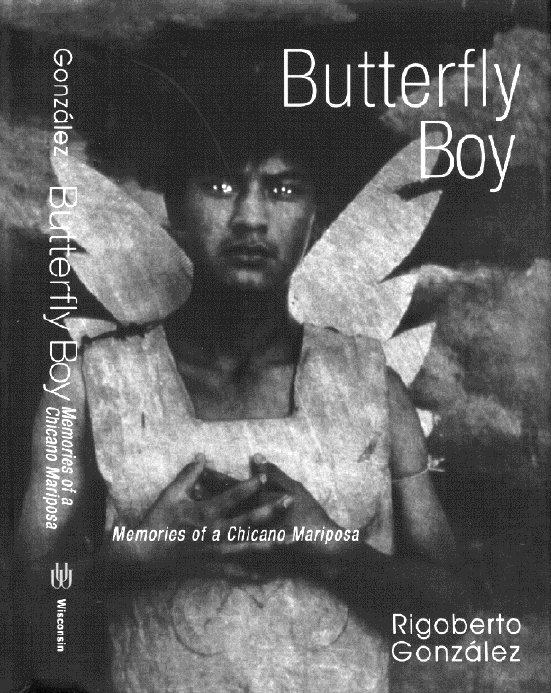
Butterfly Boy
Memories of a
Chicano Mariposa
Rigoberto González
(University of Wisconsin)

"Joto, puto, marica, maricón, margarita" are the most common Mexican words for a gay man ... according to González. He likes "mariposa" most of all, "an allusion to the feminine fluttering of eyelashes."He neglects to mention "lilo" (purple) and the current favorites, "maricornflay" (a strange marriage of "buttterfly" and "cornflakes"), and "Gaytorade," from the drink of the same name. "Gay" is equally common, pronounced as in English.
As he makes clear, to be gay in Mexico and among Mexicans is different than to be involved in gay life to the north. The Macho world makes more room for non-gay men who indulge in a quick hop in the sack. Before he was a full adult, he had experienced several sessions. "I was no stranger to sex with men ... I had been experimenting with closeted older men I had met working in the fields."
They latched onto me after work when they saw me walking down "el campo" streets, courting me as they would a girl, with low-voiced sweet talk and coy eyebrows, all of it performed clandestinely since they might have girlfriends or wives.
Despite these diversions, most of Butterfly Boy is the story of one who grows up poor in both Mexico and the United States, works from age eleven in the fields, sleeps twelve to a room with his brother and cousins, lives with his mother or grandmother who buy all his clothes at the tiangis, moves about with his family from job to job, both in the north and to the south.
His great misery as a youth is not so much the fact that he is gay --- although he likes to paint his face with rouge and wear his mother's high-heels when no one is around --- but instead, the fact that he suffers from being so fat that they hide him at the back of the school chorus. He also has to live with the taunts and insults from his grandfather, watching his father come home shit-faced, and, worst of all, when he is twelve, seeing his mother die. She had, he says, literally worked herself to death.
Although most of his family couldn't read the printed word, a couple of teachers got González interested in books. His writing (and championship spelling) resulted in top honors in high school in Indio and led to a scholarship to the University of California at Riverside.
In addition, reading full-time was a way to avoid getting involved in the family battles --- especially with his taunting grandfather and his hormone-filled cousins. The homeboys at school left him alone because he was always off in the corner with a book. When everyone else was yelling and slapping each other around, he was immersed in Valley of the Dolls, Coma, Jaws.
§ § § Books save González from war with family and peers, but we are introduced, first chapter (along with one in the middle and another at the end), to ... what should we call it? ... the hunger to get beat up, smashed around. By whom? "My lover," he says.
My lover? A man who burns him twice with his cigarette. A man who regularly calls him "bitch." A man who belittles him in front of his friends. makes him wait on them: "He's Mexican; he knows how..." A man who breaks his glasses. A man who punches him so hard, "Everything goes black."
The lining inside my mouth, behind my lips, has been split open where the teeth cut into my flesh. I run my tongue on the wounds and it stings.
"I have no idea what my lover has used to sodomize me, but I'm hoping it's still not inside my rectum because it feels as if it is. The couch has been smeared with blood."
"My lover." After all this, instead of calling him "a freak" or a "crazed sadist," González uses that tender word. "My lover."
¿Qué debemos decir? It's a sad story of a deprived, depressing childhood; it's the story of one who is strong enough to put up with the ego-murdering racial insults in high school and college ... and make it on his own. But this "my lover" business. The burns. The blood. And "I have no idea what my lover has used to sodomize me."
Rigoberto González is a more than competent writer. He would probably get a prize from Strunk and White for his style. But in matters of passion, he would perhaps earn the attention of Masters and Johnson, if not Richard Freiherr von Krafft-Ebing.
Butterflies, we believe, don't normally hang out with snakes.
--- Juana Torres-Garcia